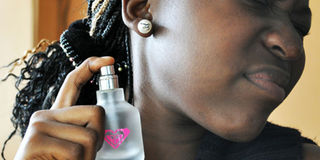Is your perfume making you sick?

A woman sprays perfume around her neck. Experts suggest that perfumes should be sprayed on the cloth other than the skin. photo by Rachel Mabala
What you need to know:
One such person is Maria Nantege, a 28 year old banker. As she celebrated her birthday in December last year, one of the gifts she received was a bottle of perfume.
Do you develop breathing complications whenever you spray that nicely scented perfume? Or, does your skin itch and turn a little red, forming small bumpy swellings? Well, these could be signs and symptoms of an allergic reaction that many perfume users are exposed to every day.
One such person is Maria Nantege, a 28 year old banker. As she celebrated her birthday in December last year, one of the gifts she received was a bottle of perfume.
“I sprayed it on my body the following morning after a shower, and immediately my body started to itch,” Nantege explains. As a result, she developed reddish swellings around her chest and back. The itching got worse when she continued using the spray for about one week.
While people like Nantege get such allergies after spraying the perfume on their bodies, some like Dickson Bwekwaso are affected by the scent of any perfume.
“I do not like the smell of perfumes because it makes me get a running nose,” he says. Bwekwaso further explains that his five-year-old daughter gets the same effect whenever his mother applies any of her perfumes in the toddler’s presence.
Expert take
Dr Edward Ogwang, a dermatologist at Skin Specialist’s Clinic in Wandegeya, a Kampala suburb explains that such allergic reactions may happen because of the chemical content commonly known as preservatives that are used in the perfume.
“These fragrance additives are of different kinds and some may be irritating to particular skin types,” Dr Ogwang explains.
He says it is hard to point out which preservatives are harmful because allergic reactions vary from person to person. “This means that one may be allergic to a particular addictive while another person may not,” he says.
According to Dr Ogwang, allergic reactions can appear in the form of eczema (itchy rash) or hives (marks on the skin that itches).
Dr Alex Kakoraki, a general practitioner at Murchison Bay Hospital in Luzira says allergy to perfumes may also result from the fact majority of the fragrances are made from flowers which particular individuals with breathing problems are allergic to.
Dr Kakoraki says it is for this reason that asthmatic patients are often advised to stay away from perfumes that have any kind of flower ingredient. To find out if you are allergic to perfumes, Dr Ogwang recommends visiting a dermatologist who will carry out an allergy skin test.
Jennifer Birungi, a beauty therapist at Beauty Nids Center says to avoid allergic reactions of perfume, a person should spray it on the cloth instead of the body.
Tips to note
•Stop using the perfume in case you notice that it is frequently irritating your skin.
•Never spray a perfume on damaged skin because it increases the irritation
•In case you realise that you have an infection as a result of using a particular perfume, ask a medical practitioner to prescribe you antibiotics.
•You can use antihistamines such as piriton, cetirizine and phenergan to treat the allergy reactions.




